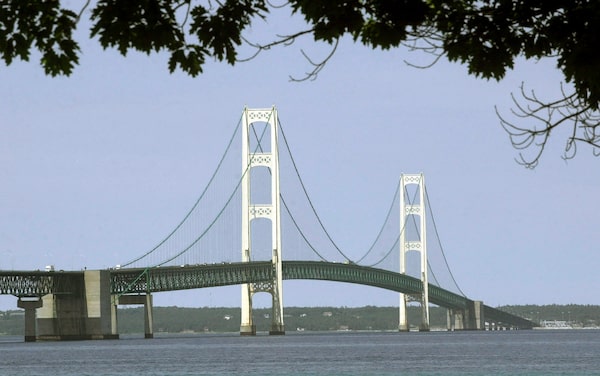
The Mackinac Bridge spans the Straits of Mackinac from Mackinaw City, Mich., on July 19.Carlos Osorio/The Associated Press
For the second time in a year, the federal government is invoking a little-known 1977 energy treaty between Canada and the United States in an effort to prevent a federal court from shutting down the Line 5 pipeline.
This time, it’s in Wisconsin, where Line 5 skirts the southwestern shores of Lake Superior before crossing into neighbouring Michigan, the state that wants the pipeline halted for fear of an ecological catastrophe in the Great Lakes.
“The economic and energy disruption and damage to Canada and the U.S. from a Line 5 shutdown would be widespread and significant,” Foreign Affairs Minister Mélanie Joly said in a statement.
That impact would include a spike in energy prices, including the propane that’s used to heat homes across much of the U.S. Midwest, as well as gasoline prices, which tested new highs across the continent throughout much of an inflation-ravaged summer.
Ms. Joly also warned about the “domino effects” of shutting down Line 5 on jobs in the Canadian oil patch, as well as additional economic effects that would be likely to resonate in both countries.
“At a time when global inflation is making it hard on families to make ends meet, these are unacceptable outcomes,” Ms. Joly said.
“The shutdown could have a major impact on a number of communities on both sides of the border that depend on the well-being of businesses along the supply chain.”
Legal disputes over Line 5 have been developing in both states since at least 2019, but took on fresh urgency in the fall of 2020 when Michigan Governor Gretchen Whitmer tried to revoke the 1953 easement that allowed the pipeline to cross the Great Lakes.
She cited the risk of an anchor strike or technical failure triggering a spill in the Straits of Mackinac, the ecologically sensitive waterway that links Lake Huron with Lake Michigan and separates the state’s upper and lower peninsulas.
The twin lines that run along the bottom of the straits are sound, Enbridge insists, but it nonetheless wants state and federal permits to install a new pipe that would be housed inside a protective underground tunnel.
Environmental concerns are also top of mind in Wisconsin, where the pipeline runs directly through the Bad River Reservation, more than 500 square kilometres of pristine wetlands, streams and wilderness that’s home to the Bad River Band of the Lake Superior Chippewa.
The band has been in court with Enbridge for more than three years, arguing that the Calgary-based company is trespassing, having allegedly violated the terms of the easements that allowed the pipeline to traverse the reservation beginning in 1953.
Enbridge, which argues that a 1992 agreement with the Bad River Band allows the pipeline to keep operating until 2043, is in the process of trying to reroute the pipeline around the reservation.
“Canada strongly supports Enbridge’s proposal to relocate this segment of Line 5 outside and around the Bad River Band Reservation,” Ms. Joly said.
“In the forthcoming negotiations with the United States under the treaty, Canada is committed to working constructively to find a solution that responds to the interests of communities, respects Canada’s rights under the treaty and ensures the continued and safe supply of energy to Central Canada.”
The band filed a motion earlier this year seeking a summary judgment against Enbridge – in other words, to shut down Line 5 without a trial. Enbridge filed its own such motion in May. The case has largely been mired in procedural wrangling ever since, with a trial date tentatively set for Oct. 24.
All the while, business groups and chambers of commerce on both sides of the border, provincial governments and Ottawa have rallied behind Enbridge in its effort to portray Line 5′s survival as a mission-critical matter of continental energy security.
Allies have argued, both in court filings as well as public forums, that Line 5 is a vital source of energy – especially propane – for several Midwestern states, and an essential source for Canadian refineries that fuel some of Canada’s busiest airports.
Just last week, the company won a key battle in the suit in Michigan, where a federal judge rejected Attorney General Dana Nessel’s efforts to get the case removed back to circuit court, where she believed she stood a better chance of success.
Enbridge remains keen on resolving the Wisconsin dispute “amicably” as it pursues the permits necessary to reroute the pipeline, the company said Monday.
“We continue to focus on providing consumers and industry in the region with safe, reliable energy,” it said in a statement, noting that the alternative to Line 5 would only make the world’s climate change problem worse.
“Pipelines continue to be a safer, more reliable way to transport fuel than truck, train or barge. These other modes burn far more fuel in order to move it, releasing more greenhouse gases into the environment and presenting increased safety risks.”
Your time is valuable. Have the Top Business Headlines newsletter conveniently delivered to your inbox in the morning or evening. Sign up today.